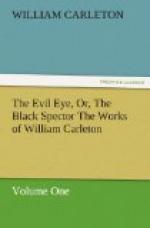—Visit to Beech Grove.—The Herbalist
Woodward now amused himself by walking and riding about the country and viewing its scenery, most of which he had forgotten during his long absence from home. It was not at all singular in that dark state of popular superstition and ignorance, that the shower of blood should, somehow or another, be associated with him and his detested mother. Of course, the association was vague, and the people knew not how to apply it to their circumstances. As they believed, however, that Mrs. Lindsay possessed the power of overlooking cattle, which was considered an evil gift, and in some mysterious manner connected with the evil spirit, and as they remembered—for superstition, like guilt, always possesses a good memory—that even in his young days, when little more than a child, her son Harry was remarkable for having eyes of a different color, from which circumstance he was even then called Harry na Suil Gloir, they naturally inferred that his appearance in the country boded nothing good; that, of course, he had the Evil Eye, as every one whose eyes differed, as his did, had; and that the thunder and lightning, the rain which drowned the bonfires, but, above all, the blood-shower, were indications that the mother and son were to be feared and avoided as much as possible, especially the latter. Others denied that the devil had anything to do with the shower of blood, or the storm which extinguished the fires, and stoutly maintained that it was God himself who had sent them to warn the country against having any intercourse that could possibly be avoided, with them. Then there was the Black Spectre that was said to follow her family; and did not every one know that when it appeared three times to any person, it was a certain proof that that person’s coffin might be purchased? We all know how rapidly such opinions and colloquies spread, and we need scarcely say that in the course of a fortnight after the night of the bonfires all these matters had been discussed over half the barony. Some, in fact, were for loading him with the heavy burden of his mother’s unpopularity; but others, more generous, were for waiting until the people had an opportunity of seeing how he might turn out—whether he would follow in his mother’s footsteps, or be guided by the benevolent principles of his step-father and the rest of the family. Owing to these circumstances, need we say, that there was an unusual interest, almost an excitement, felt about him, which nothing could repress. His brother Charles was as well-beloved and as popular as his father, but, then, he excited no particular interest, because he was not suspected to possess the Evil Eye, nor to have any particular connection with the devil.
In this case matters stood, when one day Woodward, having dressed himself with particular care, ordered his horse, saying that he would ride over to Beech Grove and pay a visit to the Goodwins. There were none in the room at the time but Charles and his mother. The former started, and seemed uneasy at this intelligence; and his mother, having considered for a time, said: “Charles, I wish to speak to Harry.” Charles took the hint, and left the mother and son to the following dialogue:—




